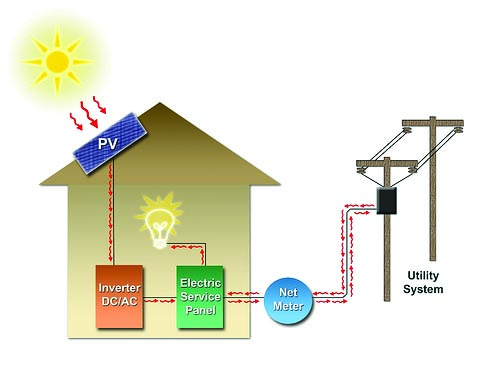Rep. Martin on net-metering

Illustrated net-metering
The Vermont Legislature has just passed a bill that will help the state have an even more diversified energy mix. The Senate, following a successful passing in the House, on a vote of 136 to 8, unanimously endorsed H.702.
H. 702 would raise the current net-metering 4% cap to 15%. Net-metering allows a ratepayer to generate and sell excessive electricity to their utility at a rate of approximately 19-20 cents per kilowatt hour of net-metered electricity. The meter runs backwards, which results in a lower amount of power being purchased by the ratepayer, therefore lowering local grid-load and lowering costs.
The current cap says each utility can take up to 4 percent of the peak load on its system from net metering projects. The bill would increase that to 15 percent.
Other states are looking at this type of bill as well, including Massachusetts. Vermont has been so successful regarding the net-metering program that the 4% cap has been met. Therefore, potential customers are being turned away.
As solar technology advances (90% of net-metering projects are solar) more residents would consider the investment, and would have the opportunity to sell-back power that their home is not using while lowering their monthly bills. The result would be less-load on the grid during peak times, an opportunity for ratepayers, greater energy independence, and a local alternative source of clean electricity.
By having lower electric consumption (during hot summer days for example), net-metering reduces utilities’ need to purchase expensive power off the grid during peak times.
After ten years under this bill, the people partaking in the program will no longer be paid the 19-20 cents wholesale kilowatt-per-hour rate; instead paid the current retail rate.
Green Mountain Power supports the program because when the grid gets stretched, rather than tapping into expensive diesel generators, this would be a preferred, more cost-efficient resource.
Becoming more efficient and having the net-metering program, there has already been a deferred $400 million in ratepayer’s future transmission costs because of the lower overall demand for energy.
The Vermont Electric Cooperative currently cannot accept any new net-metering client with out passage of this bill, which will give greater opportunity and more incentives for people to consider partaking of this opportunity.
Vermont is one of the top job-creating leaders within the solar industry, therefore if people can tap-into the net-metering program, the success can continue.
“Net metering projects are very popular in the state, and they’re popular because of the programs we have to encourage this kind of development,” explained Sen. Virginia Lyons, representing Chittenden county, in her explanation to her colleagues on the proposed expansion.
Representative Mark Woodward (D.), whom serves with me in Lamoille District-2 supports this measure as well. Currently Mark serves on the Vermont Electric Cooperative board for this area and is excited for this bill.
“The Coop is moving forward to develop a community solar project for Coop member to join” says Mark Woodward.
This year Mark is seeking re-election to continue to advocate and serve the people of the area to have the opportunity to be part of the net-metering program and promote new energy technology initiatives.
Overall Vermont has been doing very well with the net-metering program as we continue to create solutions for a strong, viable, clean, economic energy future.


